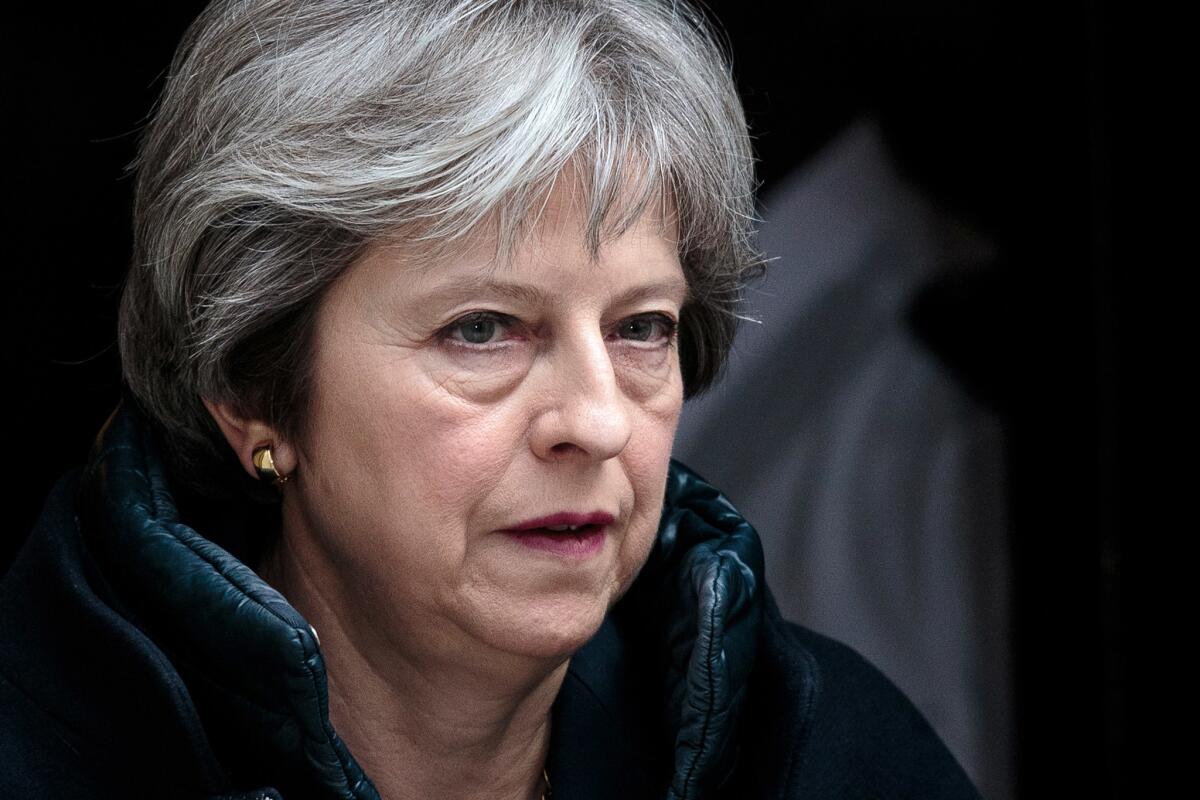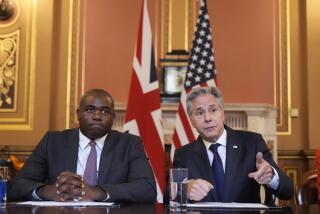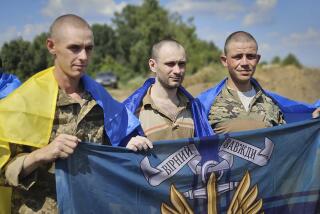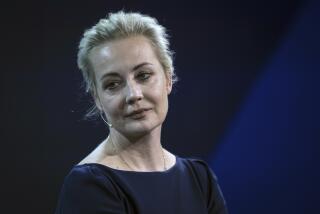Britain to expel 23 Russian diplomats over poison attack

Prime Minister Theresa May announced the expulsion of 23 Russian diplomats from Britain on Wednesday in response to the poisoning of a retired Russian double agent and his daughter.
Announcing a series of punitive measures, she told lawmakers that because Russia failed to respond to her ultimatum to explain how a deadly, military-grade nerve agent developed by Russia came to be used on British soil, she had been left with no alternative but to act.
“It is tragic that President [Vladimir] Putin has chosen to act in this way,” she said in Parliament, adding that Russia’s response had been one of “sarcasm, contempt and defiance.”
Her statement came in the House of Commons after she was briefed by intelligence chiefs.
May said that the government would expel 23 Russian diplomats who have been identified as “undeclared intelligence officers.”
They have a week to leave the country. It is the biggest expulsion of diplomats in three decades, May said. “We will fundamentally degrade Russian intelligence capability in the U.K. for years to come,” she said.
On Wednesday, the Russian Foreign Ministry called Britain’s actions “an unprecedentedly crude provocation that undermines the foundations of a normal interstate dialogue between our countries.”
In a statement posted on its website, the ministry said the decision to expel the diplomats was hostile and politically motivated, and would further agitate relations between Moscow and London.
The Russians said that instead of waiting for an international investigation, which Moscow was willing to participate in, “the British government opted for confrontation with Russia.”
The last time such a large number of diplomats was kicked out of the country was during the Cold War.
May also announced that Britain would look at new counterespionage powers and enhance its tracking of people and goods traveling to Britain from Russia by “increasing checks on private flights, customs and freight.”
The country also would freeze assets where it is found that they could threaten Britain, she said.
“There is no place for these people or their money in our country,” she said.
May also announced that all planned high-level bilateral contact with Russia would be suspended, and no official delegation — including the royal family — would attend the June soccer World Cup being held in Russia.
To those who seek to do harm, she said she had a clear message: “You are not welcome here.”
Britain has also requested an urgent meeting of the United Nations Security Council to discuss the matter.
The Foreign Office on Wednesday also updated its travel advice for British nationals already in, or traveling to, Russia.
In a statement it said that because of “heightened political tensions,” British citizens should be aware of possible anti-British sentiment or harassment.
“You’re advised to remain vigilant, avoid any protests or demonstrations and avoid commenting publicly on political developments,” it said.
The retaliatory measures were welcomed by many in Britain who had been putting pressure on May to find, and appropriately punish, those responsible for the attack. A spokesman for the prime minister said May has received the backing of President Trump, who agreed that Russia “must provide unambiguous answers” for how the nerve agent came to be used.
Nikki Haley, the U.S. ambassador to the United Nations, on Wednesday became only the second Trump administration official to reprimand Russia for the poisoning of the former Soviet spy and Putin critic. The first was Secretary of State Rex Tillerson, in his last public comments before Trump fired him. The president has been conspicuously silent on the matter.
“Let me make one thing clear from the very beginning: The United States stands in absolute solidarity with Great Britain,” Haley told the U.N. Security Council in New York. Russia, she said, was responsible for the attack.
Haley called the nerve agent attack only the latest “crime” committed by Russia, including the slaughter of civilians in Syria by Moscow-backed Syrian government forces, possibly using chemical weapons.
“This is a defining moment,” Haley said. “Time and time again, member states [of the Security Council] say they oppose the use of chemical weapons under any circumstance. Now, one member stands accused of using chemical weapons on the sovereign soil of another member. The credibility of this Council will not survive if we fail to hold Russia accountable.”
French President Emmanuel Macron, German Chancellor Angela Merkel and the Baltic states of Estonia, Latvia and Lithuania, which border Russia, have offered to support Britain.
An already tense diplomatic standoff between Britain and Russia escalated into a war of words after May told lawmakers Monday that it was “highly likely” that Russia was behind the incident, which involved the use of highly toxic nerve agents known as Novichok, a word in Russian that means “novice” or “newcomer.”
May said there were only two plausible explanations: Either Russia was directly responsible or it had lost control of its chemical weapons and they had fallen into rogue hands. May subsequently set a deadline of midnight Tuesday for Russia to respond, summoning the country’s ambassador in the U.K. to the Foreign Office.
The Russian Embassy in London has adamantly denied any involvement in the attack on Sergei Skripal, 66, and his daughter Yulia, 33, who were found slumped unconscious on a park bench in the cathedral city of Salisbury on March 4. And, it said, the British government’s actions were a clear provocation.
“Any threat to take punitive measures against Russia we’ll meet with a response,” the embassy said in a series of tweets Tuesday night, hours before May’s deadline of midnight Tuesday came and went. “The British side should be aware of that.”
An image attached to one of the tweets bore the words “fake news” with a red horizontal line across them, echoing the words Trump frequently uses to describe news outlets and reports with which he does not agree.
“The incident appears to be yet another crooked attempt by the UK authorities to discredit Russia,” one tweet read.
Russia has requested samples of the chemical substance used in the attack and said a joint investigation should take place. It also said that Moscow would cooperate only if it received a formal request for clarification, which allows for a 10-day time limit for a response under the Chemical Weapons Convention.
Skripal is a former Russian spy who had been convicted and jailed by Russia for being a double agent and passing information to Britain’s intelligence service MI6. He was released in 2010 and brought to England as part of a spy swap and given British citizenship, officials said. He and his daughter remain in critical condition in a hospital, and the case is being treated as attempted murder, police said.
Hundreds of police and military investigators have been working around the clock on the case, turning numerous sites in the usually quiet city of Salisbury into a crime scene.
Anyone who was in the area on March 4 has been asked to provide a witness statement and people who visited Zizzi restaurant or the Mill pub — where Skripal and his daughter spent time before becoming sick — were also advised to wash their clothes and wipe down any jewelry or cellphones as a precaution.
Meanwhile, investigators have also been looking into the suspicious death of another Russian exile, named in news reports as Nikolai Glushkov, who was found dead in his London home Monday night.
The front of his house has been covered in a blue tent and the property guarded by police.
He was a close friend of prominent Putin critic Boris Berezovsky, who was found hanged in the bathroom of his home in Berkshire, outside London, in 2013.
Police said that they do not believe the case is linked to events in Salisbury, but precautions were being taken because of “associations that the man is believed to have had.”
Boyle is a special correspondent. Times staff writer Tracy Wilkinson contributed to this report from Washington.
UPDATES:
2:50 p.m.: This article was updated with comments from Nikki Haley, the U.S. ambassador to the United Nations.
12:15 p.m.: This article was updated with a response from the Russian government and Britain advising its citizens in Russia to remain vigilant.
10:20 a.m.: This article was updated with several countries expressing support for Britain and other details.
6:30 a.m.: This article was updated throughout with staff reporting and more details.
This article was originally published at 5:55 a.m.
More to Read
Sign up for Essential California
The most important California stories and recommendations in your inbox every morning.
You may occasionally receive promotional content from the Los Angeles Times.










